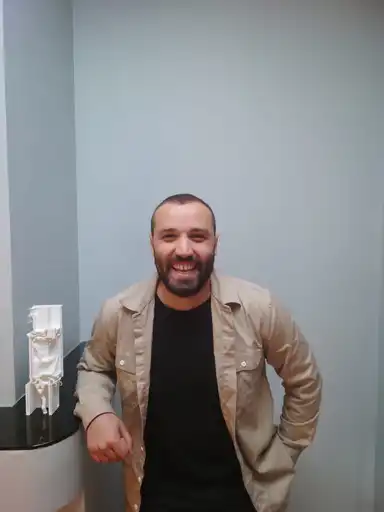output – interview
From the online publication "Fellows Published 2021-2022"
Wael el Allouche was one of the nine fellows in the academic year 2021-2022. The interview below is published in the online publication “Fellows Published” that was launched in November 2023.
fellowspublished.rietveldacademie.nl
fellowspublished.rietveldacademie.nl
Artist and Designer Wael el Allouche is interested in how abstractions, such as Data and Algorithms, shape reality and vice versa. During the fellowship, he focused on the physical aspects and traceability of navigation, intending to see how algorithms, like the shortest path algorithm used in navigation systems, affect human travel behaviour. While employing the Situationists' concept of the 'Derive', the project crafts a method that emphasises the bodily aspects of navigation through AI. To connect the abstract and the physical and see how they influence each other, he uses the resolution of phone navigation to make real-time maps of micro gestures in different spontaneous scenarios.
What was the starting point of your research project?
I wanted to create a space in which subjects are recorded using a tool or a spime that could trace or uncover human behavior, and I wanted to develop a method of recording the complexities of this human behavior. These recordings are always representations of actual behavioral patterns. So the question of how I can create a reflection of a human that translates ethically what the actual human is made of—all of their cells, culture, and complexity—is critical.
One of my initial questions was whether one could quantify the affects of racism on one’s data, or the differences in individuals’ freedom to participate in and navigate reality. The developed methods, however, can also be used to demonstrate alternative ways of navigating or reading someone’s navigation path without the assistance of an algorithm, such as in Google Maps. In general, the research demonstrates how navigation technologies affect us daily. In this sense, I have been focusing on navigation’s narrative—metaheuristics—and finding ways to alter it.
One of my initial questions was whether one could quantify the affects of racism on one’s data, or the differences in individuals’ freedom to participate in and navigate reality. The developed methods, however, can also be used to demonstrate alternative ways of navigating or reading someone’s navigation path without the assistance of an algorithm, such as in Google Maps. In general, the research demonstrates how navigation technologies affect us daily. In this sense, I have been focusing on navigation’s narrative—metaheuristics—and finding ways to alter it.
What approach did you take for the fellowship research project, and how does it relate to the role of research in your practice?
I came across the term “antecedents” a while ago and understood it to mean the things we start with, a context, or methods or ways to talk about phenomena within that context. I see no need for a sterile scientific process. I document the actual situation, an unmediated version of it.
